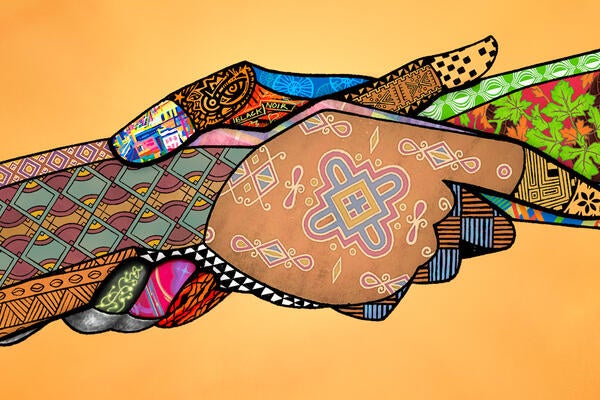
Indigenous Peoples Day
A message from the Office of the President

A message from the Office of the President
By Vivek Goel President and Vice ChancellorJune is National Indigenous History Month, and on the 21st—the summer solstice—we mark National Indigenous Peoples’ Day.
For some Indigenous Peoples, it’s a day to gather, celebrate the diversity of Indigenous Peoples, reflect on recent achievements and dream for the future. It’s also a chance to catch up with friends and family while enjoying an extra-long day of traditional food, music, conversation and games. First and foremost, I wish those celebrating a fun and relaxing day to remember.
It’s also an opportunity for everyone to truly think about the historic and ongoing colonial legacy under which First Nations, Inuit, and Métis Nations continue to live and work — and what from this legacy remains unaddressed.
At the September 2022 Commitment Ceremony, I made a promise on behalf of the institution to foster a better understanding of Indigenous history, develop an awareness of the damaging intergenerational effects of colonialism and the residential school system and taking responsibility for vital components of the reconciliation process.
I am proud to say that collectively as an institution we have made some progress since that historic day.
Visitors from across the world joined us on campus last week for Spring Convocation. Upon entering they were greeted by the Two-Spirit Pride flag which was raised as one of several Pride month activities, for the first time in the institution’s history.
The Convocation also saw the inaugural use of an Eagle Staff in the University of Waterloo's Convocation ceremonies. Welcomed in March 2023, the Staff is an important element of the Indigenous relationship to Earth and those who have protected it. Leading the Chancellor's procession into each ceremony, the Eagle Staff honours the University’s First Nations, Métis and Inuit community members, and uplifts Indigenous traditions, cultures and strengths. The Chancellor and I were also proud to wear Indigenous beading on our regalia and are grateful to Marilyn Sutherland, a Cree master beader from Kitchener, for her work in adorning our robes. These additions, and the contributions of Elder Myeengun Henry and the Cedar Hill Singers, are part of the work underway to ensure Indigenous perspectives and cultures are represented at our institution’s ceremonies.
Earning a university degree and walking across the stage is a great achievement — yet it’s one that has too often been denied Indigenous Peoples because of systemic racism and colonial policy.
Recently Waterloo became the first institution in Ontario to work towards addressing centuries of colonialism and oppression by offering a new tuition waiver for admitted students who are members of the Six Nations of the Grand River and the Mississaugas of the Credit First Nations, upon whose traditional territory Waterloo is situated. Waterloo will also offer Ontario domestic tuition rates for Indigenous students from elsewhere in Canada and Native American students from the United States.
These are a few of many initiatives that we have collaboratively implemented across our campuses as we continue the process of reconciliation. In addition to the tuition waiver, bursaries, scholarship funding and a dedicated Indigenous student recruiter are other ways we hope to boost Indigenous student enrollment. Once here, students will have access to supports including Indigenous student groups and campus spaces, an Indigenous Residence Community and wellness supports. We have also made progress on hiring Indigenous faculty as well as new staff roles dedicated to developing resources and incorporating Indigenous knowledges and research methodologies in the curriculum. And as we continue to find new ways to celebrate Indigenous culture across our campuses, we are committed to this on-going process that enriches our institution and community.
None of these important advancements would have been possible without the hard work and dedication of The Office of Indigenous Relations, The Equity, Diversity, Inclusion & Anti-racism Office (EDI-RO), and the Waterloo Indigenous Students Centre. However, these are just first steps in the journey towards decolonization and reconciliation.
I would like to use this opportunity to thank all involved. Your capacity for innovation, collaboration and imagination is the main driving force behind this change. Six months ago today, on the winter solstice, we shared a video message featuring Savanah Seaton, director of the Shatitsirótha' Waterloo Indigenous Student Centre (WISC) and I exchanging knowledge about the significance of the solstice in Indigenous life and culture.
I learned a great deal that day, and as we take time today on the summer solstice to celebrate Indigenous communities and identities, I urge everyone to learn as much as possible about the oppressive systems we’ve inherited and use our imaginations to think about what’s next in our shared journey to reconciliation.
I speak for a great many of us when I say I’m looking forward to the upcoming official release of the Office of Indigenous Relations’ first Strategic Plan and see that journey come into sharper focus.

Read more
A message from the President and Vice-Chancellor

Read more
Defying convention to shape our global futures

Read more
As we prepare to celebrate Fall 2025 convocation this week, I would like to extend my heartfelt congratulations to our class of 2025.
The University of Waterloo acknowledges that much of our work takes place on the traditional territory of the Neutral, Anishinaabeg, and Haudenosaunee peoples. Our main campus is situated on the Haldimand Tract, the land granted to the Six Nations that includes six miles on each side of the Grand River. Our active work toward reconciliation takes place across our campuses through research, learning, teaching, and community building, and is co-ordinated within the Office of Indigenous Relations.